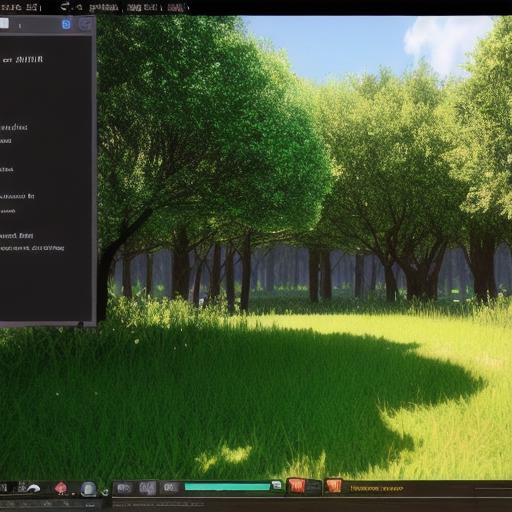Title: Is C a Suitable Programming Language for Game Development? A Comprehensive Analysis and Comparison with Other Languages
Introduction
Game development is an exciting and rapidly evolving field, with new technologies and programming languages emerging all the time. One of the most popular and widely used programming languages in game development is C, but there are many other options available, each with its own strengths and weaknesses. In this article, we will explore the pros and cons of using C for game development, and compare it to other commonly used languages, such as Java, Python, and Unity. We will also look at real-life examples of games developed using C, and discuss the skills and experience required to work with this language.
Why Use C for Game Development?
C is a low-level programming language that offers a high level of control over hardware resources, making it a popular choice for game development. It is fast, efficient, and can handle complex calculations and operations, which are essential for creating smooth, seamless gameplay experiences. Additionally, C has a large community of developers who contribute to its open-source libraries and tools, which can save time and effort when building games from scratch.
Some of the main reasons why C is commonly used for game development include:
- Speed and Efficiency: C is a compiled language, which means that it converts source code into machine code at compile time, allowing it to run much faster than interpreted languages like Python. This makes it ideal for games that require real-time performance and responsiveness.
- Control over Hardware Resources: C offers direct access to hardware resources, such as memory and CPU cores, giving developers the ability to optimize their code for specific systems or devices. This is particularly useful in mobile game development, where hardware resources are limited and must be used efficiently.
- Large Community of Developers: C has a large community of developers who contribute to its open-source libraries and tools, which can save time and effort when building games from scratch. Additionally, many game engines, such as Unreal Engine and Lumberyard, have built-in support for C, making it easy to develop games using this language.
- Portability: C is platform-independent, meaning that it can run on a wide range of devices and operating systems without the need for extensive code changes. This makes it easier to develop games that can be played across multiple platforms, such as PC, consoles, and mobile devices.
Real-Life Examples of Games Developed using C
C is used by many successful game developers, including id Software, Epic Games, and CD Project Red, the creators of the popular game series Wolfenstein and The Witcher.
- Doom: id Software’s classic first-person shooter game was developed primarily in C, with some additional components written in assembly language. The game’s fast, smooth gameplay was achieved through its use of C’s direct access to hardware resources and optimized code.
- Unreal Engine: Epic Games’ popular game engine, which is used by many developers, has built-in support for C. This allows developers to use C to create custom plugins and extensions that can be easily integrated into their games.
- The Witcher 3: Wild Hunt: CD Project Red developed the hit game series The Witcher using C, with some components written in other languages, such as Python and Lua. The game’s graphics and performance were achieved through its use of C’s control over hardware resources and optimized code.
Skills and Experience Required to Work with C
While C is a powerful and versatile programming language, it also requires a certain level of skill and experience to work effectively with. Some of the key skills and experience required to work with C in game development include:
- Low-Level Programming: C is a low-level language that requires a deep understanding of computer architecture and hardware resources. Developers must be able to write optimized code that takes advantage of these resources, while also avoiding common pitfalls like buffer overflows and memory leaks.
- Memory Management: C does not provide automatic memory management, which means that developers must manually allocate and deallocate memory for their programs. This can be challenging, particularly when working with complex data structures and large amounts of data.
- Portability: C is a platform-independent language, but it requires careful consideration of differences in hardware and operating systems when developing games that can run on multiple platforms. Developers must be able to write code that works seamlessly across different devices and operating systems.
- Debugging and Troubleshooting: Debugging C code can be challenging, particularly when working with low-level systems programming. Developers must have strong problem-solving skills and the ability to use debugging tools effectively to identify and fix issues in their code.
Comparing C with Other Languages for Game Development
While C is a popular choice for game development, there are many other programming languages available that can be used for this purpose. In this section, we will compare C to some of the most commonly used languages in game development, including Java, Python, and Unity.
- Java: Java is a high-level object-oriented language that is widely used in game development. It offers many features that make it easy to develop games, such as automatic memory management and built-in support for multithreading. However, it can be slower than C when it comes to performance, particularly on low-end systems.
- Python: Python is a popular high-level programming language that is often used for game development due to its ease of use and simplicity. It has a large community of developers who contribute to its open-source libraries and tools, making it easy to develop games without needing extensive knowledge of low-level systems programming. However, it can be slower than C when it comes to performance, particularly on high-performance systems.
- Unity: Unity is a popular game engine that uses C as its primary language. It offers many features that make it easy to develop games, such as built-in support for 2D and 3D graphics, physics simulations, and animations. However, it can be slower than native C code when it comes to performance, particularly on high-end systems.
FAQs
- Is C faster than other languages like Java or Python?
C is generally faster than other languages like Java or Python because it is a compiled language that offers direct access to hardware resources. However, the speed of a language depends on many factors, including the specific implementation and hardware being used.

- Do I need to know low-level systems programming to use C for game development?
While C is a low-level language, it does not require extensive knowledge of low-level systems programming to be used effectively in game development. Many resources and tools are available to help developers learn the basics of C and optimize their code for performance.
- Can I develop games using C on multiple platforms?
Yes, C is a platform-independent language, meaning that it can run on a wide range of devices and operating systems without the need for extensive code changes. This makes it easier to develop games that can be played across multiple platforms, such as PC, consoles, and mobile devices.
- What are some common pitfalls when working with C?
C is a powerful language, but it also requires careful consideration of issues like buffer overflows and memory leaks, which can cause crashes and other problems in programs. Additionally, C does not provide automatic memory management, which means that developers must manually allocate and deallocate memory for their programs.
Conclusion

C is a powerful and versatile programming language that offers many benefits for game development, including low-level control over hardware resources and fast performance. While it requires a certain level of skill and experience to work effectively with, it is also a popular choice among developers due to its ease of use and flexibility. When comparing C with other languages for game development, it is important to consider the specific requirements of your project and choose the language that best meets those needs. With careful consideration and the right resources and tools, anyone can learn to use C effectively for game development.



